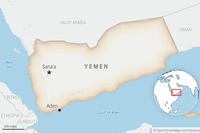As many as 2,500 Russian mercenaries from the shadowy "Wagner Group" have faced off against 3,500 Syrian civil war veterans recruited by Turkey in the proxy battle for control in Libya, according to the Pentagon's Inspector General.
U.S. Africa Command, which is focused on rooting out Islamic State and al Qaida-linked groups in the region, is essentially on the sidelines in Libya while closely monitoring activities in the civil war, the IG's quarterly report on counter-terror operations in Africa states.
Read next: Pentagon Bans Confederate Flag on Military Bases Without Mentioning It by Name
AFRICOM told the IG "that it has no credible reports of ISIS or al Qaida-affiliated militants among the mercenary forces from Syria, and assessed that the mercenaries are 'very likely' fighting in Libya for personal and financial reasons rather than ideological or political motivations," according to the 81-page report sent to Congress on Thursday.
AFRICOM put the number of Syrian fighters at about 3,800 at the end of March and said they were recruited by NATO ally Turkey in support of the U.S. and United Nations-recognized Government of National Accord (GNA) in Tripoli, the report states
Russia, Egypt and the United Arab Emirates have lined up behind the so-called Libyan National Army (LNA) led by former Libyan Gen. Khalifa Haftar, who holds U.S. citizenship, while Qatar and Turkey support the GNA.
"In Libya, fighting in the year-long civil war intensified following a significant increase of foreign mercenary forces," Acting IG Sean O'Donnell said in his preamble to the report.
"As many as 2,500 fighters associated with the Wagner Group, a Russian paramilitary company, and as many as 3,800 Syrian fighters were in Libya during the quarter" as peace efforts floundered, O'Donnell said.
To complicate an already confusing civil war, Russia has also been recruiting Syrians who fought against the Moscow-backed Syrian regime of President Bashar al-Assad to bolster the Wagner Group, the IG's report adds.
The Syrian fighters aiding the Wagner Group "are former Syrian opposition rebels who reportedly agreed to fight in the Libyan civil war in exchange for $1,000 per month and clemency from the Assad regime," it states.
The report did not estimate how much the Russians with the Wagner Group were being paid but said the Russians have "provided advanced equipment, such as unmanned aerial vehicles, and advanced capabilities, such as trained snipers, to the conflict, resulting in significant casualties to forces aligned with the GNA."
In a release Wednesday, AFRICOM said that the Russian mercenaries are planting land mines and improvised explosive devices around Tripoli and stretching east to the city of Sirte, Haftar's stronghold.
In May, Army Gen. Stephen Townsend, the AFRICOM commander, charged that Russia had sent 14 advanced MiG-29 Fulcrum fighter aircraft to Libya in an effort to prop up Haftar's forces.
Russia has repeatedly denied involvement in the Libyan fighting or knowledge of the Wagner Group's support for Haftar.
The overall conclusion of the IG's report is that "violent extremist organization (VEO) activity appears to be outpacing U.S., European, and African efforts to counter it" in East, North and West Africa.
In Somalia and East Africa, the al Qaida-linked al-Shabab terrorist organization "remains adaptive, resilient, and capable of attacking Western and partner interests," AFRICOM told the IG.
"During the quarter, al-Shabab maintained its capability to conduct operations, using insurgent-style tactics, including harassing and hit-and-run attacks, ambushes, and improvised explosive device operations" against Somali and African Union forces, the report states.
In West Africa, violence by extremist organizations increased in Burkina Faso, Mali, Nigeria, Niger, Chad and Cameroon during the quarter, "reflecting a steady increase in violence over the past two years, the report adds.
"The security situation in West Africa is a result of a complicated commingling of longstanding ethnic hostilities and the use of jihadist ideology that seeks to vanquish Western influence," the IG said.
-- Richard Sisk can be reached at Richard.Sisk@Military.com.
Related: Russian Mercenaries Are Planting Mines in Libya to Shore Up a Rebel Leader, AFRICOM Says














